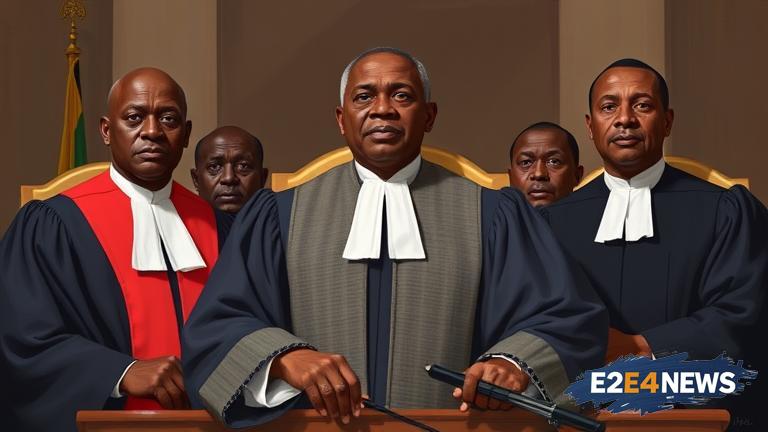The Ghanaian judiciary has been under intense scrutiny in recent times, with the Chief Justice, Torkornoo, facing a committee hearing. In a show of solidarity, former and current top judges, including Sophia Akuffo, Anin-Yeboah, and Dotse, have lined up to defend the embattled Chief Justice. The committee hearing, which was convened to investigate allegations against the Chief Justice, has been marked by intense drama and controversy. The judges, who have a combined wealth of experience in the judiciary, have argued that the allegations against the Chief Justice are unfounded and lack merit. They have also expressed concern about the potential consequences of the committee’s findings, which they believe could undermine the independence of the judiciary. Sophia Akuffo, a former Chief Justice, has been particularly vocal in her defense of Torkornoo, arguing that the allegations against him are part of a larger plot to destabilize the judiciary. Anin-Yeboah, the current Chief Justice, has also weighed in on the matter, stating that the judiciary is committed to upholding the rule of law and ensuring that justice is served. Dotse, another senior judge, has argued that the committee’s investigation is an overreach of its powers and that the judiciary is capable of regulating itself. The committee hearing has been marked by heated exchanges between the judges and the committee members, with the judges accusing the committee of bias and the committee members accusing the judges of trying to intimidate them. Despite the controversy surrounding the committee hearing, the judges have remained resolute in their defense of the Chief Justice, arguing that he is innocent until proven guilty. The outcome of the committee hearing is still uncertain, but one thing is clear: the Ghanaian judiciary is facing a crisis of confidence, and the consequences of the committee’s findings could be far-reaching. The judges have called for calm and restraint, urging all parties to allow the committee to complete its work without interference. They have also expressed confidence in the ability of the judiciary to withstand the current challenges and emerge stronger and more resilient. The committee hearing has sparked a national debate about the role of the judiciary in Ghanaian society, with many calling for reforms to ensure that the judiciary is more accountable and transparent. Others have argued that the judiciary is being unfairly targeted and that the committee’s investigation is a witch-hunt. As the committee hearing continues, one thing is clear: the future of the Ghanaian judiciary hangs in the balance, and the consequences of the committee’s findings could be devastating. The judges have urged all parties to remain calm and to allow the committee to complete its work without interference. They have also expressed confidence in the ability of the judiciary to withstand the current challenges and emerge stronger and more resilient. The committee hearing has highlighted the need for reforms in the judiciary, including measures to ensure greater transparency and accountability. It has also sparked a national debate about the role of the judiciary in Ghanaian society, with many calling for greater oversight and regulation. The judges have argued that the judiciary is committed to upholding the rule of law and ensuring that justice is served, but they have also acknowledged that there is room for improvement. As the committee hearing continues, the nation waits with bated breath for the outcome, which could have far-reaching consequences for the Ghanaian judiciary. The judges have called for calm and restraint, urging all parties to allow the committee to complete its work without interference. They have also expressed confidence in the ability of the judiciary to withstand the current challenges and emerge stronger and more resilient. The committee hearing has sparked a national debate about the role of the judiciary in Ghanaian society, with many calling for reforms to ensure that the judiciary is more accountable and transparent. Others have argued that the judiciary is being unfairly targeted and that the committee’s investigation is a witch-hunt. The outcome of the committee hearing is still uncertain, but one thing is clear: the Ghanaian judiciary is facing a crisis of confidence, and the consequences of the committee’s findings could be far-reaching. The judges have urged all parties to remain calm and to allow the committee to complete its work without interference. They have also expressed confidence in the ability of the judiciary to withstand the current challenges and emerge stronger and more resilient. The committee hearing has highlighted the need for reforms in the judiciary, including measures to ensure greater transparency and accountability. It has also sparked a national debate about the role of the judiciary in Ghanaian society, with many calling for greater oversight and regulation. The judges have argued that the judiciary is committed to upholding the rule of law and ensuring that justice is served, but they have also acknowledged that there is room for improvement. As the committee hearing continues, the nation waits with bated breath for the outcome, which could have far-reaching consequences for the Ghanaian judiciary.
